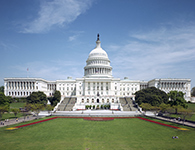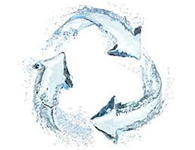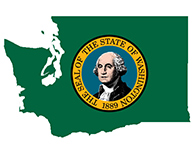NACWA Kicks Off New Year, Seeks To Shape 2016 Legislative Agenda
 NACWA is getting off to a running start in 2016 on its legislative agenda, meeting this week with key Congressional committees and Members to discuss clean water priorities for the 2nd session of the 114th Congress.
NACWA is getting off to a running start in 2016 on its legislative agenda, meeting this week with key Congressional committees and Members to discuss clean water priorities for the 2nd session of the 114th Congress.
NACWA’s key advocacy staff, including CEO Adam Krantz, met with Republican and Democratic staff directors for the House Water Resources and Environment Subcommittee to discuss a variety of clean water legislative priorities for this upcoming legislative session, including reauthorization of the Water Resources Reform and Development Act (WRRDA), stormwater management and water reuse issues, and Integrated Planning and affordability. NACWA indicated that its members are interested in identifying legislative opportunities to support the ongoing efforts of clean water utilities in their communities to improve water quality through innovation and efficient use of ratepayer resources.
In addition, NACWA staff met this week with Rep. Earl Blumenauer (D-OR) during a meeting of the Water Infrastructure Network (WIN) Executive Committee to discuss the Representative’s ongoing legislative efforts to bolster federal funding for clean water infrastructure. Rep. Blumenauer indicated that he intends to reintroduce a version of the “Water Trust Fund Act” this year (H.R. 3582 in the 113th Congress) and expressed a willingness to work with WIN and NACWA to recast the legislation to address affordability issues related to low-income ratepayers.
NACWA is planning an active legislative agenda this year in Congress. NACWA members are encouraged to stay involved and connected with their Members of Congress through regular meetings back home in their districts and by coming to Washington in April for Water Week and the National Clean Water Policy Forum, April 11 – 13, 2016.
Microbead Ban Signed By President
 President Obama signed the Microbead-Free Waters Act of 2015 on December 28, an important victory for the clean water community and NACWA. The law bans the manufacture of rinse-off cosmetic products containing plastic microbeads after July 1, 2017, and prohibits the sale of these products after July 1, 2018. The House of Representatives unanimously passed H.R. 1321
President Obama signed the Microbead-Free Waters Act of 2015 on December 28, an important victory for the clean water community and NACWA. The law bans the manufacture of rinse-off cosmetic products containing plastic microbeads after July 1, 2017, and prohibits the sale of these products after July 1, 2018. The House of Representatives unanimously passed H.R. 1321  on December 7, followed by Senate approval on December 18. NACWA was a strong advocate for the legislation and shared information through the NACWA Clean Water Exchange on the various state and local microbead bans that preceded the federal legislation.
on December 7, followed by Senate approval on December 18. NACWA was a strong advocate for the legislation and shared information through the NACWA Clean Water Exchange on the various state and local microbead bans that preceded the federal legislation.
NACWA also supported the microbead ban through its Toilets Are Not Trashcans campaign, which provides advocacy to reduce harmful products that are flushed or drained into the sewer system. Microbeads are difficult to remove during typical wastewater treatment processes and are harmful to aquatic life and ecosystems, but can be easily substituted with natural alternatives. Please see Advocacy Alert 16-01  for more information.
for more information.
Pennsylvania’s High Court Delivers Major Victory In Biosolids Land Application Case
 On December 21, the Pennsylvania Supreme Court issued a unanimous decision in support of the land application of biosolids. The case - Gilbert v. Synagro - addresses whether biosolids application is an agricultural activity that is protected under Pennsylvania right-to-farm laws
On December 21, the Pennsylvania Supreme Court issued a unanimous decision in support of the land application of biosolids. The case - Gilbert v. Synagro - addresses whether biosolids application is an agricultural activity that is protected under Pennsylvania right-to-farm laws  and represents the first time that any state supreme court has addressed the practice of land application of biosolids under right-to-farm acts (RTFAs).
and represents the first time that any state supreme court has addressed the practice of land application of biosolids under right-to-farm acts (RTFAs).
To receive protection under the state RTFA, the operation must be a "normal agricultural operation." The state Supreme Court held that the RTFA's definition of a normal agricultural operation calls for broad, categorical determinations "aimed at protecting farms now and in the future" and held that the practice of biosolids land application does indeed fall within the definition even though the practice is not specifically identified in the Act.
NACWA joined the Pennsylvania Municipal Authorities Association and NACWA Member Agency the Alleghany County Sanitary Authority (ALCOSAN) in filing an amicus curiae brief  in the litigation. The Association applauds the court's decision, which acknowledges and embraces the widespread use of recycled biosolids in the state and nationally.
in the litigation. The Association applauds the court's decision, which acknowledges and embraces the widespread use of recycled biosolids in the state and nationally.
While this precedent is only binding in Pennsylvania, all fifty states have enacted some form of RTFA. This decision will be very influential nationwide in future RTFA cases involving land application of biosolids. For more details on this case, see NACWA’s Litigation Tracking website or contact Amanda Waters.
Water Groups Urge Funding For Reuse To Address Drought
 NACWA joined a coalition of water sector organizations this week on a letter
NACWA joined a coalition of water sector organizations this week on a letter  encouraging the U.S. Bureau of Reclamation to direct additional drought funds appropriated by Congress towards water reuse research and infrastructure. Congress approved funding to address drought issues as part of the FY 2016 Omnibus spending bill passed in December, and the coalition letter emphasizes that water reuse is an economically viable way to address drought concerns. The letter also notes that investing in water reuse systems can provide sustainable, drought proof supplies of water not only for the current drought, but also for future water shortages as well.
encouraging the U.S. Bureau of Reclamation to direct additional drought funds appropriated by Congress towards water reuse research and infrastructure. Congress approved funding to address drought issues as part of the FY 2016 Omnibus spending bill passed in December, and the coalition letter emphasizes that water reuse is an economically viable way to address drought concerns. The letter also notes that investing in water reuse systems can provide sustainable, drought proof supplies of water not only for the current drought, but also for future water shortages as well.
Other organizations joining the letter include the Water Reuse Association, the American Water Works Association (AWWA), the Association of Metropolitan Water Agencies (AMWA), the National Association of Water Companies (NAWC), the Water Environment Federation (WEF), the American Public Works Association (APWA), and the Association of California Water Agencies (ACWA). This broad coalition of groups demonstrates the strong support for water reuse within the water sector.
NACWA Supports Proposed Ban On Flushing Of Hazardous Waste Pharmaceuticals
 NACWA submitted comments
NACWA submitted comments on December 23 on EPA’s proposed rule, Management Standards for Hazardous Waste Pharmaceuticals, supporting the proposed ban on healthcare facilities “disposing of hazardous waste pharmaceuticals down the toilet or drain.” NACWA supported the broad range of healthcare facilities included in the proposal, such as pharmacies, coroners, and long-term healthcare facilities, and recommended that the proposal be clarified so that the ban also applies to septic systems and decentralized wastewater treatment systems, not just to sewers leading to publicly owned treatment works (POTWs).
on December 23 on EPA’s proposed rule, Management Standards for Hazardous Waste Pharmaceuticals, supporting the proposed ban on healthcare facilities “disposing of hazardous waste pharmaceuticals down the toilet or drain.” NACWA supported the broad range of healthcare facilities included in the proposal, such as pharmacies, coroners, and long-term healthcare facilities, and recommended that the proposal be clarified so that the ban also applies to septic systems and decentralized wastewater treatment systems, not just to sewers leading to publicly owned treatment works (POTWs).
Pharmaceuticals are a focus of NACWA’s Toilets Are Not Trashcans campaign, and the Association has advocated for many years that federal agencies remove flushing as a method of pharmaceutical waste disposal. While the proposed rule will only apply to pharmaceuticals that are classified as hazardous wastes, it includes a clear statement from EPA that non-hazardous waste pharmaceuticals also be disposed of with incineration. In addition, a Drug Enforcement Administration (DEA) rule finalized last year states that flushing is not an acceptable method for making controlled substances “non-retrievable.”
These rules are important steps towards wider recognition that no pharmaceuticals should be flushed and that improved disposal methods are needed for the public and healthcare facilities.
NACWA Urges EPA To Withdraw Proposed Federal Criteria For Washington State
 NACWA filed comments
NACWA filed comments December 22 urging EPA Region 10 to withdraw its proposed human health criteria for the State of Washington.
December 22 urging EPA Region 10 to withdraw its proposed human health criteria for the State of Washington.
Over the past two years the Washington State Department of Ecology has conducted an extensive public engagement process to craft an approach to toxics control that would have provided more comprehensive protection than afforded by the Clean Water Act (CWA). However, EPA disagreed with key policy and risk decisions made by the state – decisions that the CWA reserves for the states alone – and followed through on its threat of federal promulgation, proposing its own criteria in a September 2015 Federal Register notice.
In response, Washington State has agreed to modify its proposal to meet EPA’s demands. NACWA’s comments focus on the need for EPA to now step aside and let the state develop its own proposal “without the threat or aggressive timetable of a federal rulemaking looming overhead.” NACWA has previously raised concerns with EPA Region 10 about its tactics in Washington State, arguing that the Agency’s actions amount to inappropriate federal overreach.
Oregon has already developed criteria that comply with EPA’s requirements and Region 10 is now turning its attention to Idaho, where the state proposal has elicited federal concerns for not hewing closely enough to EPA’s desired approach. NACWA will continue to closely monitor developments and protect its members’ interest as necessary.